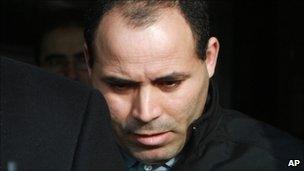How are terror suspects treated internationally?
- Published

Algerian-born Mohamed Harkat wears a tracking device and is banned from using a computer
As the UK government wrestles with how to deal with people they suspect may be planning terrorism but against whom they have insufficient evidence for a criminal trial, Claire Bolderson from the BBC World Service discovers it is not a uniquely British problem.
No two countries have identical ways of dealing with terrorist suspects.
The UK review focuses on control orders, which place a terrorism suspect under conditions some critics say are akin to house arrest.
These are just one way of tackling a problem which has grown since 9/11.
"There's been a huge increase in the reliance on intelligence information and on intelligence co-operation between different services," says Roisin Pillay, a senior legal advisor at the International Commission of Jurists in Geneva.
The trouble is, few intelligence services will countenance their information being used in open court and even if it is, there are often doubts about its origins.
For example, was it obtained under torture?
This caused particular difficulties in prosecution, said Ms Pillay "and an increasing reliance on administrative measures".
These are measures outside the criminal justice system which do not require the criminal standard of proof.
Tracking device
In the Netherlands, while there has been discussion about something similar to control orders they have never been introduced.
There are though 'Disturbance Orders' issued by a local mayor with no judicial oversight and allowing for police to make regular house calls to a suspect, to follow them and speak to colleagues and neighbours whenever they like.
More common, internationally, is a reliance on immigration laws to impose restrictions on suspects who are held pending deportation.
That is what happened to Mohamed Harkat in Canada.
The Algerian-born refugee was detained in 2002 and held without being charged for four years.
He was then released, but under what is known as a "Security Certificate" - a provision in immigration law which meant his freedom was severely curtailed pending his deportation.
For a while he could not be left alone even inside his home.
His wife or mother-in-law had to be with him at all times.
After a legal challenge, the restrictions were relaxed but he still wears a tracking device and is banned from using a computer.
"On top of that, I was never charged in Canada or any other country," Mr Harkat told the BBC World Service.
"I'd like to be charged and be given full evidence to defend myself."
The evidence against Mr Harkat comes from informants whose identity has not been revealed.
A recent court review of the Security Certificate found that Mr Harkat has "engaged in terrorism and is a danger to the security of Canada".
He has been served with deportation papers.
'Pre-emptive' system
Several European countries impose restrictions on foreign suspects. Surveillance is common.
But for much of western Europe there is less reliance on administrative measures and more on criminal justice systems which allow a great deal of leeway in dealing with those accused of terrorism.
In France, for example, special investigative magistrates can charge a suspect with "criminal association in relation to a terrorist undertaking", then hold them without trial for up to four years while they gather hard evidence.
It is not clear how many people have been held in this way though some lawyers and human rights groups say it could run into the hundreds.
Thirty-three-year-old Adlene Hicheur is one of them.
The French-Algerian had a promising career as a particle physicist until he was detained 15 months ago.
He is being investigated for connections to al-Qaeda.
Mr Hicheur's former boss, physicist Jean-Pierre Lees is leading a campaign for his freedom.
"He sees drug traffickers held with him who are released after four months," said Mr Lees, "and he's kept for 15 months without anything."
The French authorities say their "pre-emptive" system works well.
They point out that, unlike in Britain, the suspect is in the criminal justice system, not controlled by an order signed by a politician and the investigation is supervised by a magistrate not the police.
- Published11 January 2011
- Published26 January 2011